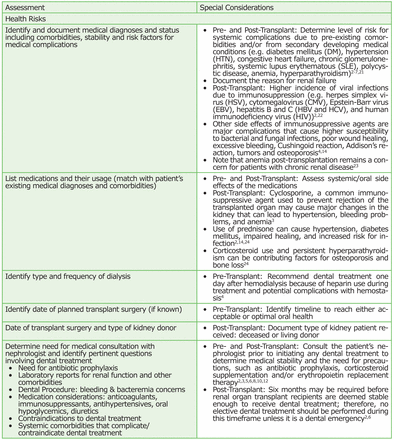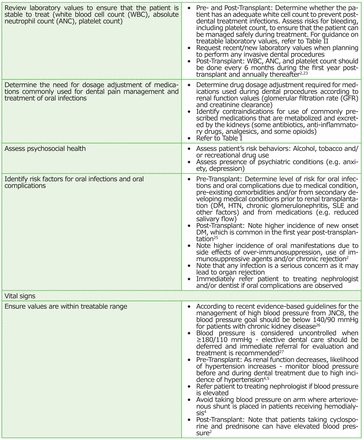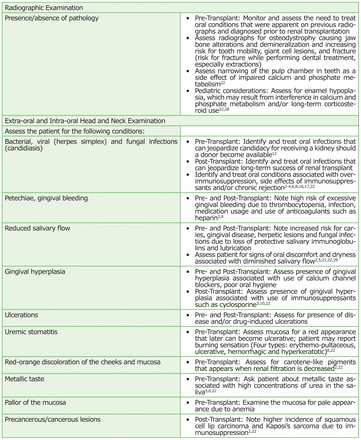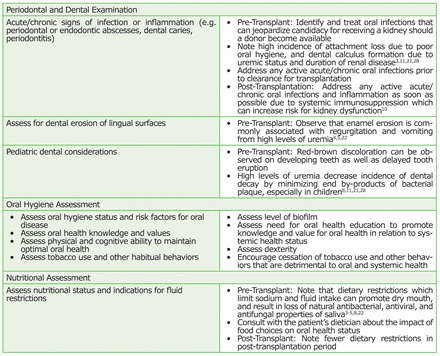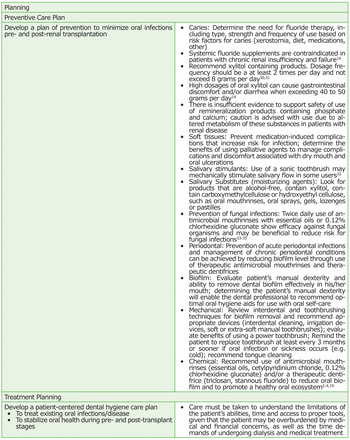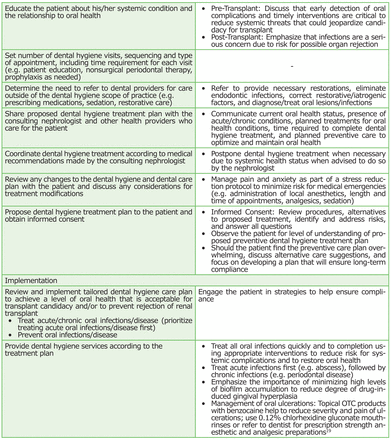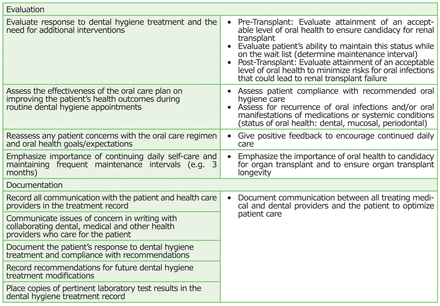Abstract
Purpose: Candidates and recipients of kidney transplants are at high risk for oral infections due to systemic co-morbidities, and disease and drug-induced immunosuppression. Developing oral infections while on the waiting list can jeopardize candidacy for receiving a kidney, and post-operatively increases the chance for organ rejection. Therefore, it is imperative to minimize oral disease risks in this population. A comprehensive, oral preventive care protocol is presented to guide dental professionals with patient management throughout the process of care. Proper dental and dental hygiene care can help to prevent oral infections, optimize oral health, and enhance overall health and quality of life for the renal transplant population.
Introduction
Currently, there are approximately 96,000 people in the U.S. waiting for a kidney transplant.1 The waiting list is long because there are limited renal donors, and dialysis prolongs the lives of individuals with end stage renal disease (ESRD) allowing patients to wait a longer period of time before an organ becomes available. The waiting period for a kidney ranges from 5 to 10 years depending upon the state in which the transplant will take place. In spite of the odds, a renal transplant is the preferred treatment for patients with ESRD.2,3
Patients with ESRD are at high risk for oral infections due to use of immunosuppressants and from complications related to comorbidities and/or from secondary developing medical conditions. These conditions include diabetes mellitus, hypertension, chronic glomerulonephritis, systemic lupus erythematosus, anemia and hyperparathyroidism, all of which may compromise both oral and overall health and longevity.1,4,5 Therefore, to provide safe, high-quality care to candidates and recipients of a kidney transplant, it is critical for dental and medical providers to be current in the best oral care practices for managing this population.3
A dental hygienist's knowledge and expertise in oral health can be beneficial to prepare, educate and support the oral health of the patient before, during and after transplantation, and to help ensure long-term organ success. A comprehensive, standardized oral care preventive protocol for use with renal transplant candidates and recipients was developed to guide dental professionals with decision-making throughout the process of care. Preventive care is essential to minimize and/or prevent oral infections, which may decrease risk of organ rejection and enhance overall health and quality of life.
There are recommendations in the literature that can be used as guidelines to follow when treating kidney, and other transplant populations.2,3,6-10 However, these recommendations lack consistency, and currently, there is no comprehensive dental care protocol in place that focuses on prevention.2,3,11 Further, dental care protocols can vary across institutions, as well as within a given hospital center according to the type of organ being transplanted.2,3,9,12,13 Dental professionals will benefit from having a comprehensive oral care protocol that is specific to renal transplant patients that can be used as a guide to help optimize patient care outcomes.
Use of an oral care preventive protocol for this patient population also provides the foundation for a well-informed collaboration between dental and medical providers. Dental professionals will understand what information is needed from the medical team for use with treatment planning to ensure the safe provision of quality oral health care. Following a protocol also may help to reduce patient mismanagement due to lack of adequate knowledge, training and experience with treating this medically-complex population. More dental professionals will encounter patients who are either awaiting renal transplant or who have received a transplant due to end-stage renal disease associated with diabetes.
During the pre-transplantation period, it is recommended that dental professionals consult with the patient's nephrologist prior to initiating any dental treatment to determine medical stability and the need for treatment modifications, such as antibiotic prophylaxis, corticosteroid supplementation and/or erythro-poietin replacement therapy.2,3,5,6,8-10 Contraindications for use of dental-related medications that are metabolized and excreted by the kidneys should be addressed. These medications include, but are not limited to, anti-inflammatory drugs, analgesics and some opioids (Table I). In addition, renal function values should be obtained to determine the need for dosage adjustment for drugs used during dental procedures (Table II).2-5,8-10 Other relevant laboratory values needed to assess risk for infection and bleeding include complete blood cell count (CBC), absolute neutrophil count (ANC), and platelet count (Table II).2,4,8-10
Oral health professionals should examine the patient to detect any signs of oral pathology, infection and acute and/or chronic inflammation. Any active dental disease should be eliminated, non-elective restorative and periodontal work should be completed, faulty dental appliances should be adjusted, and thorough oral hygiene education should be given to the patient to avoid possible infections.2,3,9 It is also important that dental professionals maintain communication with the treating nephrologist and transplant team before and after the transplant procedure so that the patient's oral health can be properly monitored, as poor oral health increases risk for systemic complications.
Transplant recipients are placed on immunosuppressant therapy to prevent organ rejection. Patients are typically managed with a combination of multiple immunosuppressants, which may include cyclosporine, azathioprine, mycophenolate, tacrolimus and prednisone.2,3,6,14 These medications suppress the host immune system, producing a chronic inflammatory response to bacterial plaque biofilm. Gingival enlargement, though most commonly observed with cyclosporine, also has been shown to occur in patients taking tacrolimus.15
Oral candidiasis and herpes simplex virus are other common oral infections in recipients of renal transplants, especially immediately after transplantation, which can lead to systemic infections.2,3,6,12,16 In particular, Candida infections are linked to bloodstream, esophagus, and other organ infections. A previous study showed that prevalence of oral candidiasis in patients with renal transplants ranged from 7.7 to 46.7% as compared to healthy controls.16,17
Research supports a relationship between oral disease and malnutrition.18 Candidates for renal transplants should adhere to a restricted diet, which limits sodium and fluid intake. This diet can promote dry mouth and the resultant loss of natural antibacterial, antiviral and antifungal properties of saliva. The loss of protective salivary immunoglobulins increases risk for caries, gingival disease, herpetic lesions and fungal infections. Patients also may experience increased trauma due to the decreased amount of saliva lubricating the oral mucosa.2,3,19 A dental hygienist has expertise to guide treatment decisions and recommendations on various oral care products that can reduce oral disease risks and improve comfort and function.
The purpose of this short report is to disseminate a new comprehensive oral care protocol created to assist oral health professionals with proper assessment, management and maintenance steps that are essential to safely care for candidates for and recipients of a renal transplant. Dental hygiene actions associated with each phase of the process of care are illustrated in Figure 1, located at the end of this manuscript.
Discussion
A comprehensive oral care preventive protocol identifies special considerations and provides clear guidance for tailoring a treatment plan for candidates for and recipients of a kidney transplant. Use of this protocol will help dental care providers to adequately address the complexity of diseases, oral conditions and medications that are commonly encountered in pre- and post-renal transplant. When these considerations are addressed for this population, oral infections that can jeopardize candidacy for and longevity of renal transplants can be minimized or prevented.
A comprehensive, oral care preventive protocol is now available to help guide decision-making throughout the process of care when treating the renal transplant population. Use of this evidence-based protocol supports best practices by dental professionals so that they can safely care for this growing medically-complex population. Optimizing oral health helps to ensure candidacy while awaiting renal transplant, decreases risk of organ rejection post-transplant, and enhances overall health and quality of life.
Conclusion
Collaboration between medical and dental care providers is critical while caring for candidates for and recipients of a kidney transplant. This oral care preventive protocol provides a framework that addresses special considerations pertaining to this specific transplant population. Dental professionals are encouraged to use this protocol as a checklist while caring for patients with end-stage renal disease and post-transplant. Further, dental professionals may use this protocol to initiate collaboration with medical providers, encourage discussion with the patient, and the planning and delivery of comprehensive oral care. Research is needed to assess the impact of use of this protocol on patient outcomes.
Dental and Dental Hygiene Actions According To the Process of Care
Footnotes
Ursula Reyes, RDH, MS, is a clinical instructor in the Division of Periodontology, Diagnostic Sciences, and Dental Hygiene at the Herman Ostrow School of Dentistry of USC. Ann Eshenaur Spolarich, RDH, PhD is a Professor and Director of Research, Arizona School of Dentistry and Oral Health, and formerly Clinical Associate Professor in the Division of Dental Public Health and Pediatric Dentistry at the Herman Ostrow School of Dentistry of USC. Phuu Pwint Han, DDS, PhD, is an Assistant Professor of Clinical Dentistry in the Division of Dental Public Health and Pediatric Dentistry at the Herman Ostrow School of Dentistry of USC.
This study supports the NDHRA priority area, Clinical Dental Hygiene Care: Investigate how dental hygienists use emerging science to reduce risk in susceptible patients (risk reduction strategies).
- Copyright © 2016 The American Dental Hygienists’ Association




